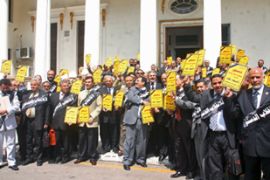Egyptian MPs stage walkout
Protest over constitutional changes that opposition says could lead to police state.

| Your Views |
|
“It is really sad to see Egypt a republic country turned into a Kingdom” Be Humble |
But, in an interview published on Saturday with Akhbar Al-Youm, a government newspaper, Mubarak defended the amendments.
Mustafa al-Feki, a member of Egyptian parliament and chairman of the Egyptian People’s Assembly foreign affairs committee, said: “Not all the opposition has left, but I’m not saying everything is rosy.
“I wish the Muslim Brotherhood had insisted to stay and expressed their ideas and views.
“Those who are already members of parliament have the right to say what they want, have it published and reject what they want to reject.
“Democracy is a kind of balance between different kinds of groups.”
The ruling National Democratic Party (NDP) has a large enough majority of seats in the Egyptian parliament to pass the 34 amendments.
The party has made the changes to allegedly stress citizenship as the main pillar of society as opposed to religion or ethnicity.
But without the participation of most opposition parties, the NDP has been accused of lacking the moral authority to implement such changes.
Magdi al-Daqaq, editor of Al Helal magazine, questioned the kind of parliamentary proposals that would unite otherwise opposing parties.
“I wonder how a right-wing party like the Wafd party strikes a deal with the Muslim Brotherhood. Or more astonishingly the Tagamma and other leftist parties get together with them today.”
Hamdin Sabbahi, Al Karama party leader, said: “We have at the same time to respect our common agenda which include exactly democracy and political freedoms in Egypt.”
Egyptians did not see the walkout from parliament because television cameras were banned.